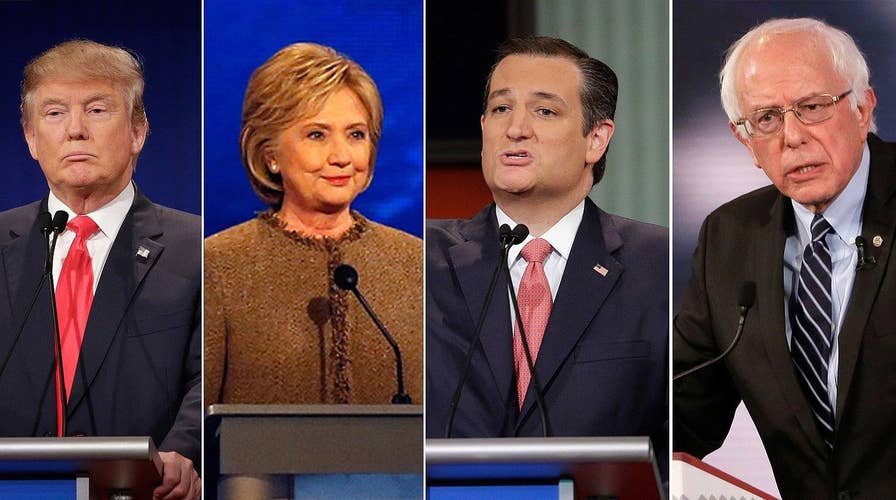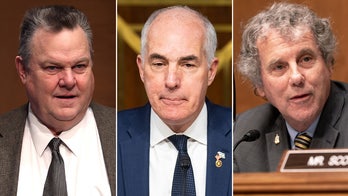Winners and losers from the Iowa caucuses
On 'Hannity,' panel provides insight into the voting
After tens of millions of dollars poured into the feverish Iowa campaign, it came down to roughly a half-dozen coin tosses: And Hillary Clinton had luck on her side.
The former secretary of state declared victory overnight in the contest against Bernie Sanders, and the party – without officially declaring her the winner -- showed Clinton had an insurmountable lead over the Vermont senator.
But several reports emerged that in the closest precincts, stray local delegates were decided in a simple coin toss. According to the Des Moines Register, local reports showed unassigned delegates were decided with a coin toss in as many as six precincts – and Clinton won every time. Subsequent reports indicated Sanders won at least one or two separate coin tosses, interrupting Clinton's winning streak.
The Register described one incident in Ames, where dozens of caucus participants reportedly disappeared in the count – this left one of the delegates unassigned, and party officials recommended the dispute be settled with the flip of a coin. According to the Des Moines Register, a Clinton backer called “heads” and won, giving her campaign the extra delegate.
As of early Tuesday, Clinton had been awarded 699 state delegate equivalents, while Sanders had been awarded 695 state delegate equivalents. It does not appear Sanders can make up the difference.
The Clinton campaign issued a statement early Tuesday declaring victory, saying, "Statistically, there is no outstanding information that could change the results and no way that Senator Sanders can overcome Secretary Clinton's advantage."
A number of news outlets, including Fox News, have not yet formally called the contest for the former secretary of state.
But the razor-thin outcome, decided in part by coin tosses, could still put Clinton in a precarious position heading into New Hampshire, where Sanders holds a substantial lead. In Iowa, Sanders also closed what was once a roughly 30-point gap to bring the race to a near draw.
Sanders said the results send a “profound message” to the media and political establishment.
Anti-establishment overtones also were apparent on the Republican side, where Texas Sen. Ted Cruz claimed a more resounding victory in the state, over Donald Trump.
“Tonight is a victory for the grassroots. Tonight is a victory for courageous conservatives across Iowa and all across this great nation,” Cruz told cheering supporters.
On the Democratic side, Sanders noted that Iowa's 44 Democratic national convention delegates would be distributed almost evenly between the two candidates. The Associated Press reported that Clinton had captured at least 22 delegates to Sanders' 21, with the remaining one going to the statewide winner.
En route to New Hampshire, where he holds a substantial lead in the polls ahead of the Feb. 9 primary, Sanders vowed, "We're in this to the convention, and I think this [result] shows the American people we're a campaign that can win."
In the Republican campaign, Cruz fought hard in recent weeks to make up lost ground in the polls and was helped in part by a sophisticated ground operation. He also hammered Trump for his decision to skip last week's Republican debate.
Meanwhile, Florida Sen. Marco Rubio's stronger-than-expected third place finish was helped in large part by late deciders. Entrance polling conducted by Fox News found that 35 percent of GOP caucus-goers made their choice within the last few days of the race. Of those, 30 percent broke for Rubio.
Rubio's campaign also suggested Trump’s debate boycott helped change the dynamic in the race.
With all but one precinct reporting, Cruz had 28 percent, Trump had 24 percent and Rubio had 23 percent. Retired neurosurgeon Ben Carson placed a distant fourth in the race with 9 percent, while Kentucky Sen. Rand Paul placed fifth with 5 percent.
An energized Rubio touted the results at a post-caucus rally.
“For months they told us we had no chance. … They told me I needed to wait my turn,” Rubio said. “But tonight … here in Iowa, the people in this great state sent a very clear message. After seven years of Barack Obama, we are not waiting any longer to take our country back.”
Trump, for his part, argued he beat initial expectations by placing second and predicted he'd still win in New Hampshire next week.
“We will go on to get the Republican nomination, and we will go on to easily beat Hillary or Bernie or whoever the hell they throw up there,” he said. He closed his speech by saying: "I think I might come here and buy a farm, I love it.”
Republicans voted by private ballot. The state's 30 Republican delegates are awarded proportionally based on the vote, with at least eight delegates going to Cruz, seven to Trump and six to Rubio.
Two candidates dropped their presidential bids after poor showings. Former Maryland Gov. Martin O'Malley, who was pulling in about 1 percent support, suspended his campaign for the Democratic nomination Monday night. And on the GOP side, former Arkansas Gov. Mike Huckabee also suspended his campaign.
Fox News’ Ed Henry and Jake Gibson and The Associated Press contributed to this report.





